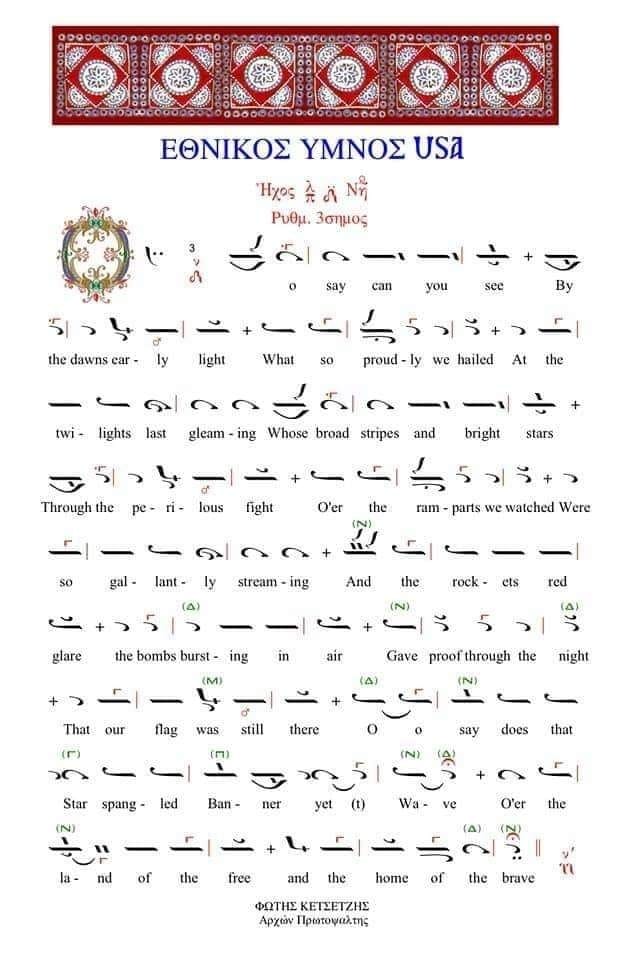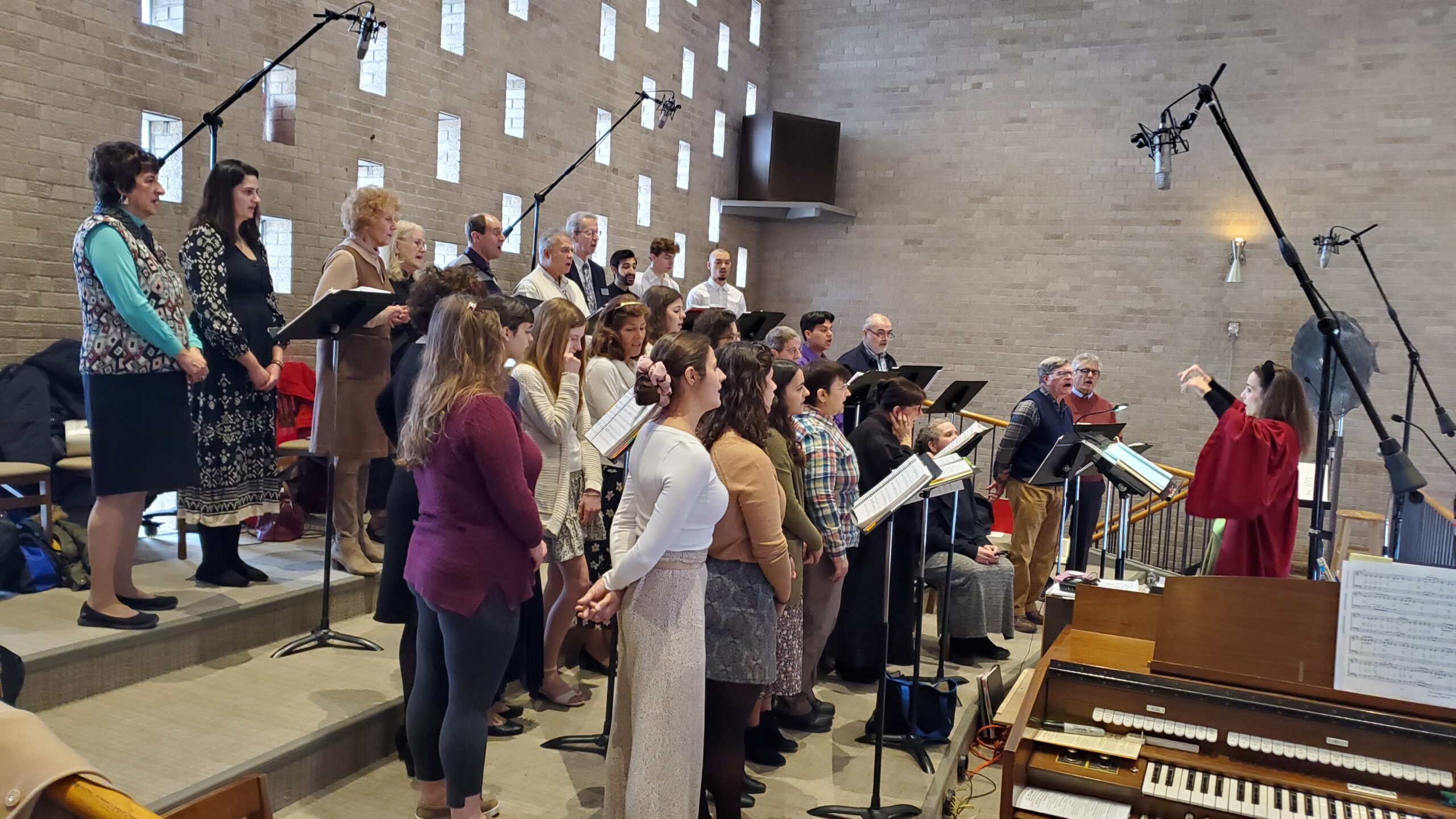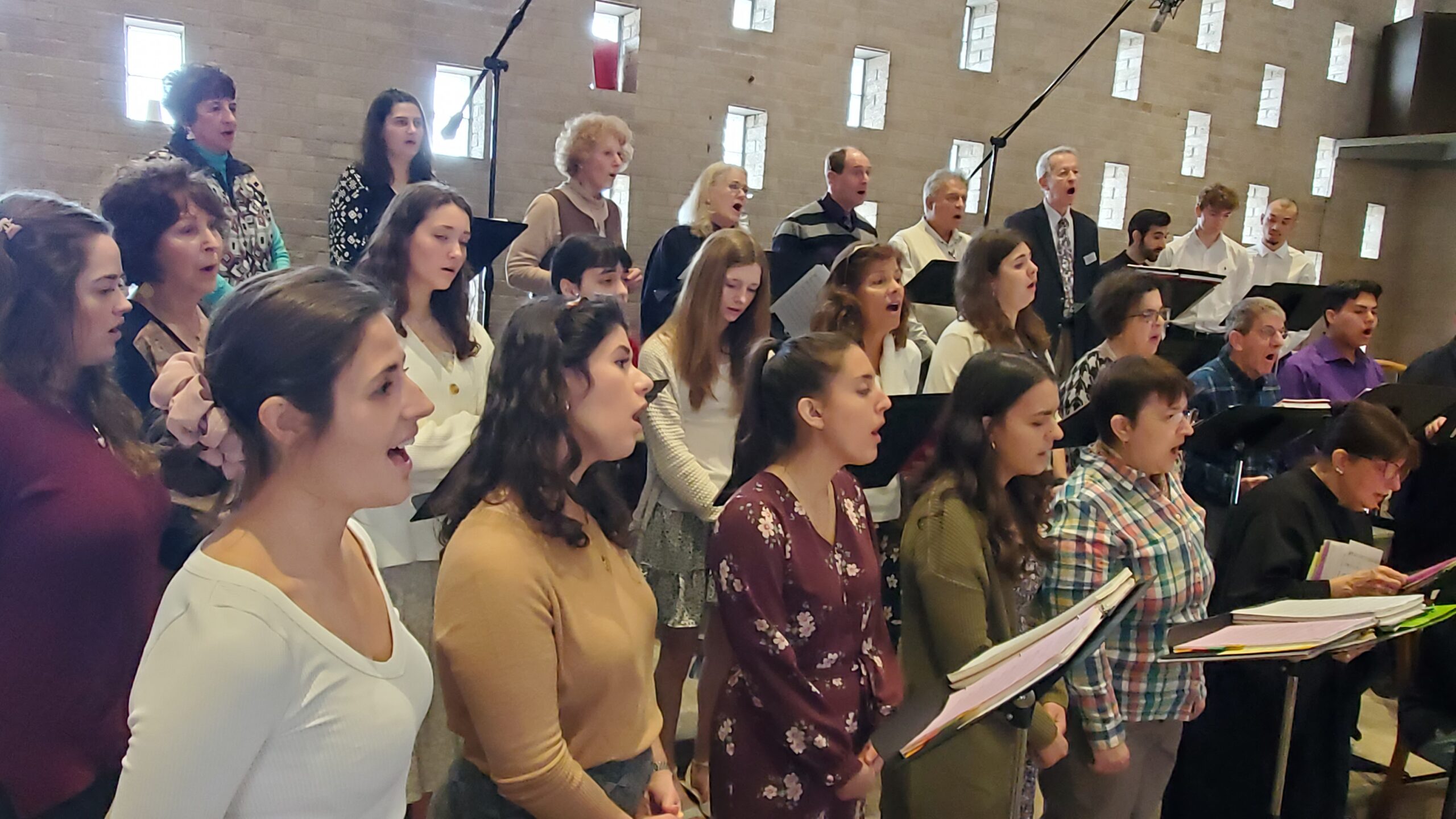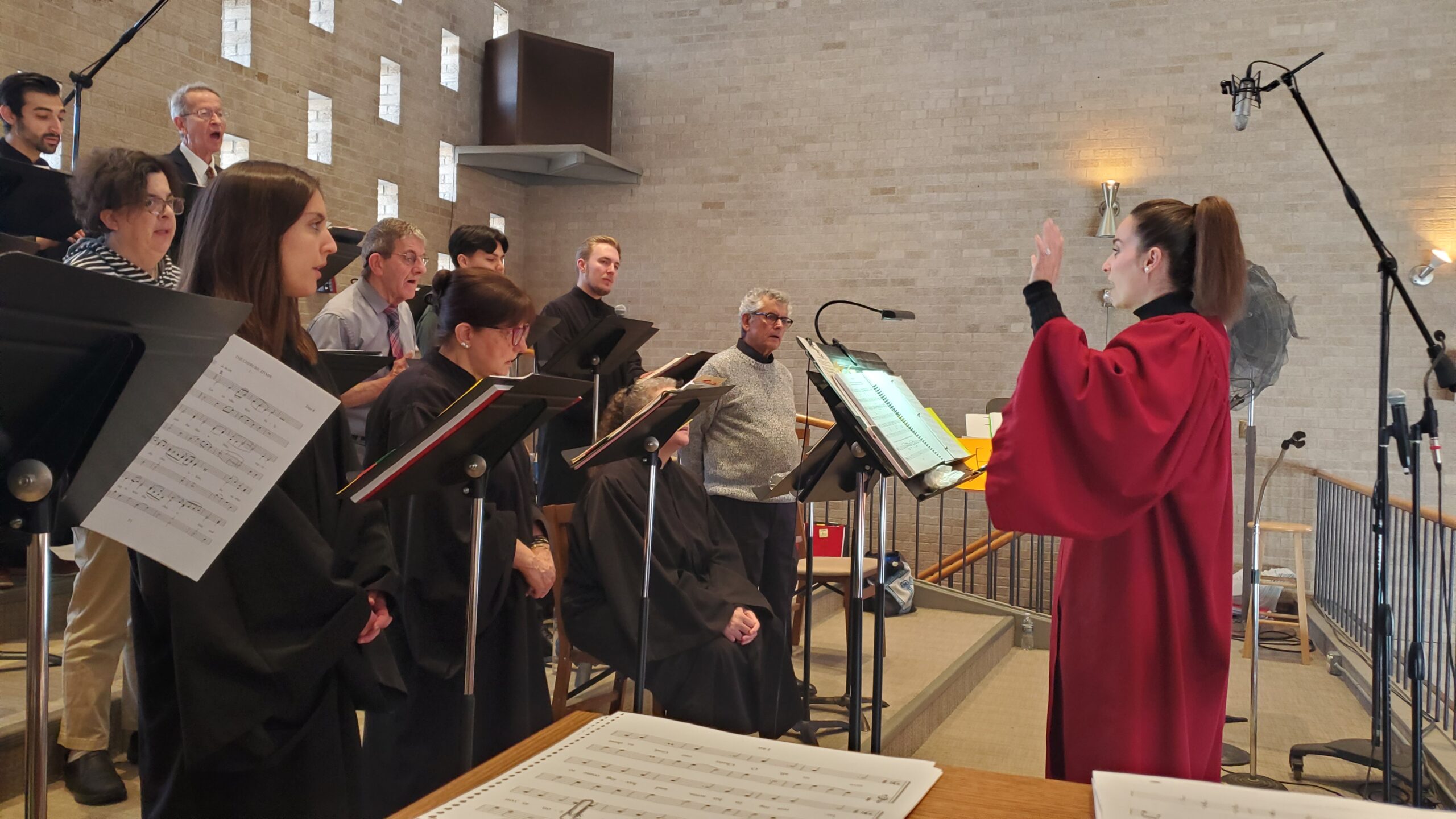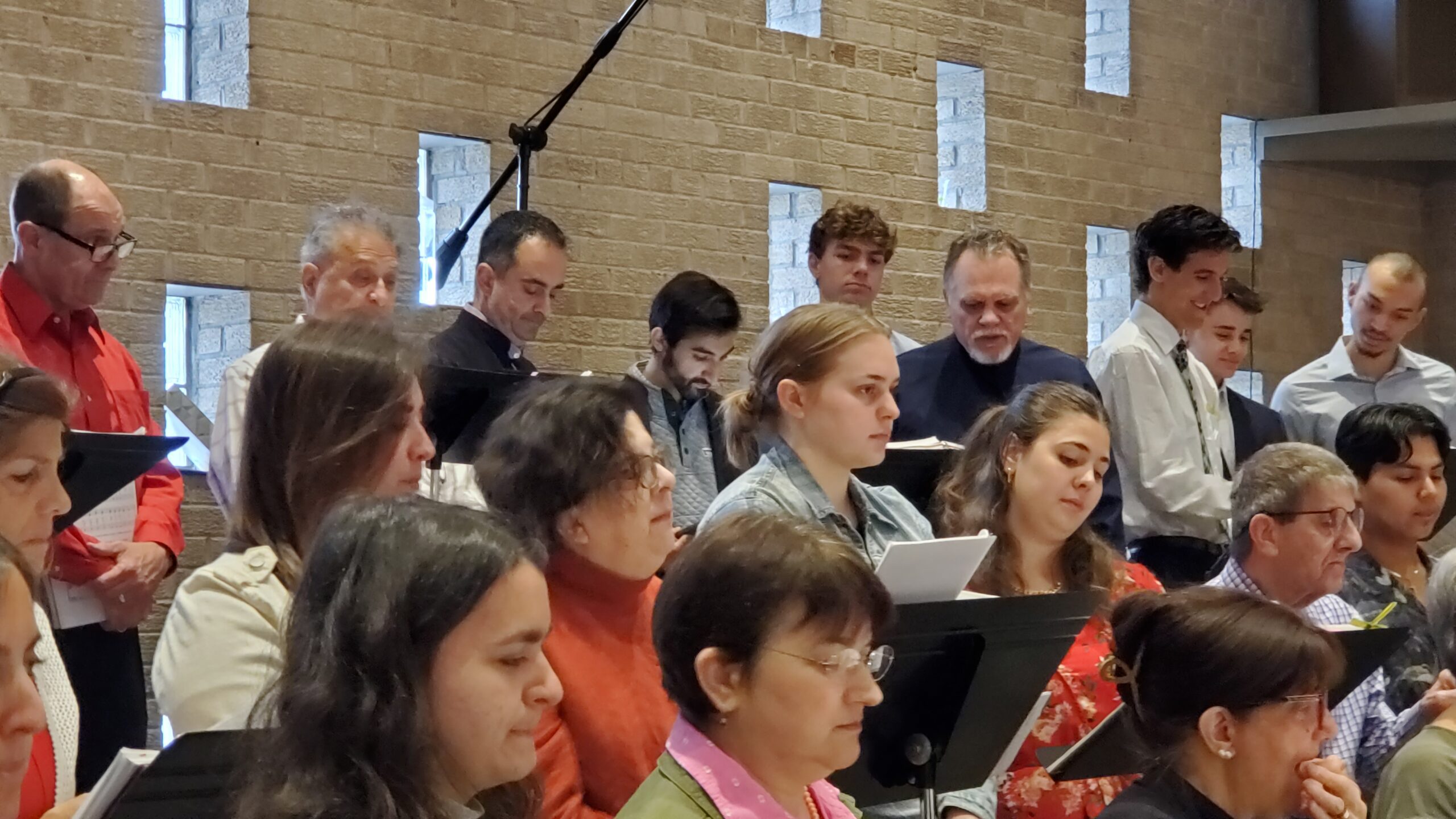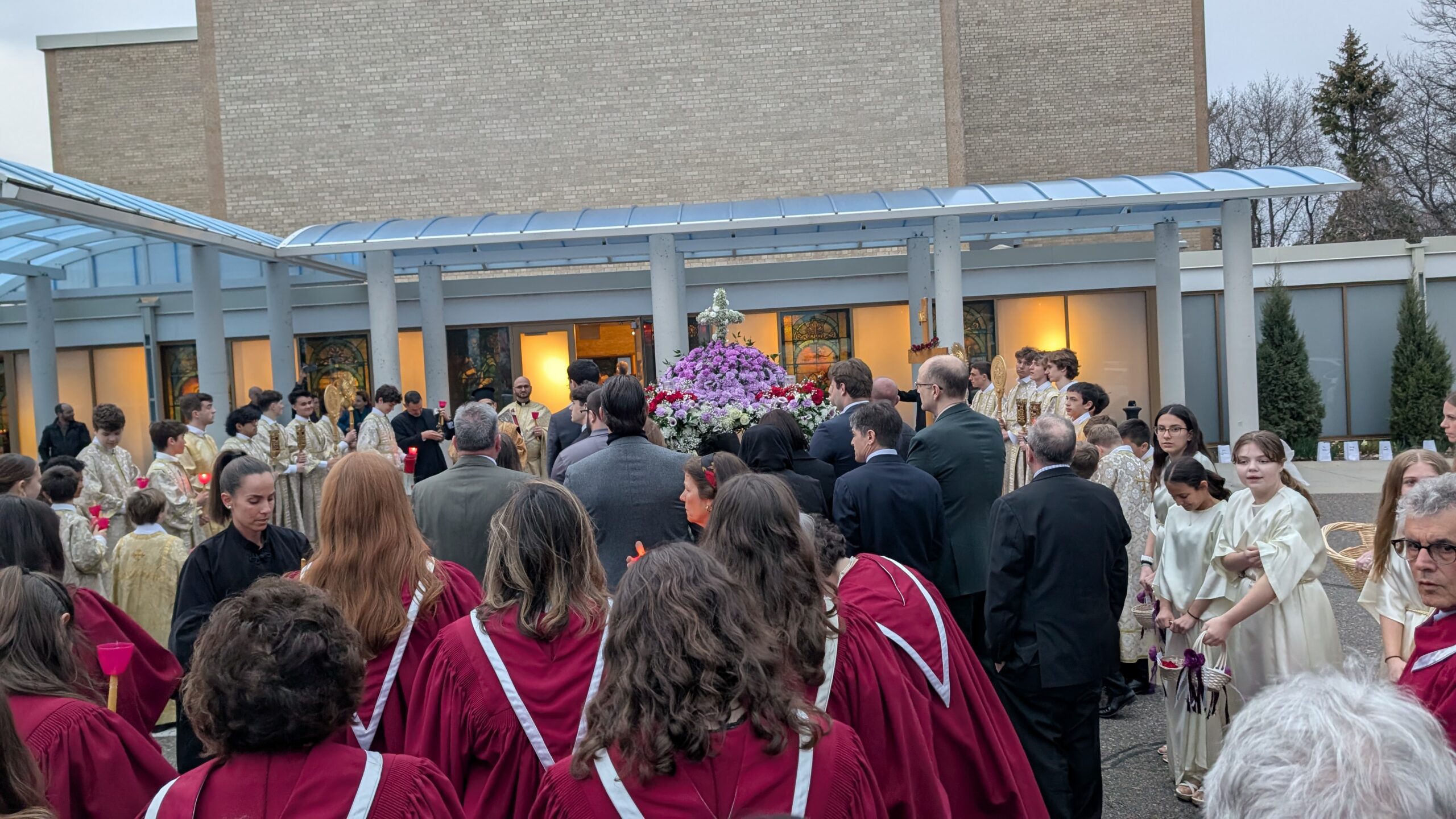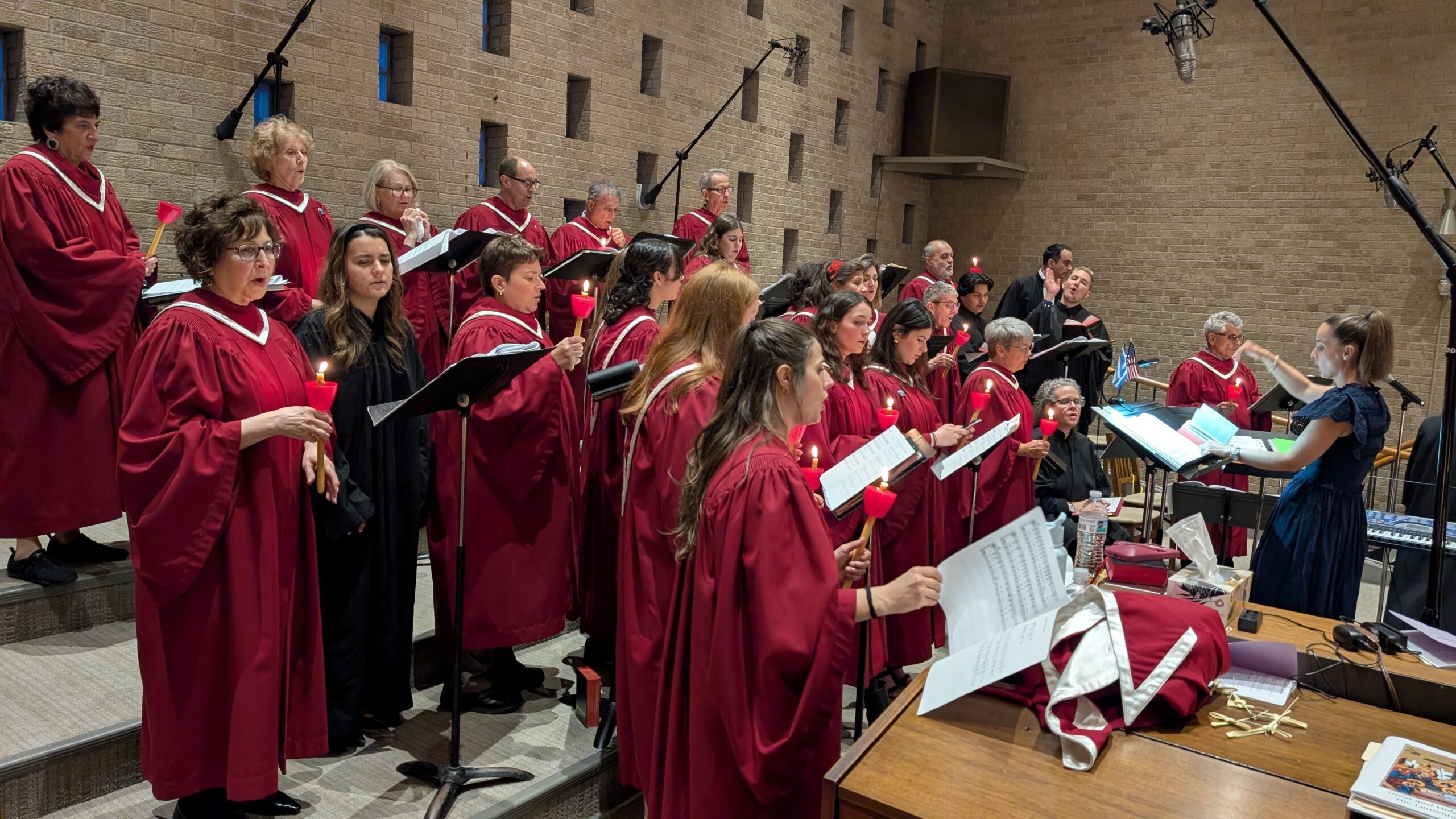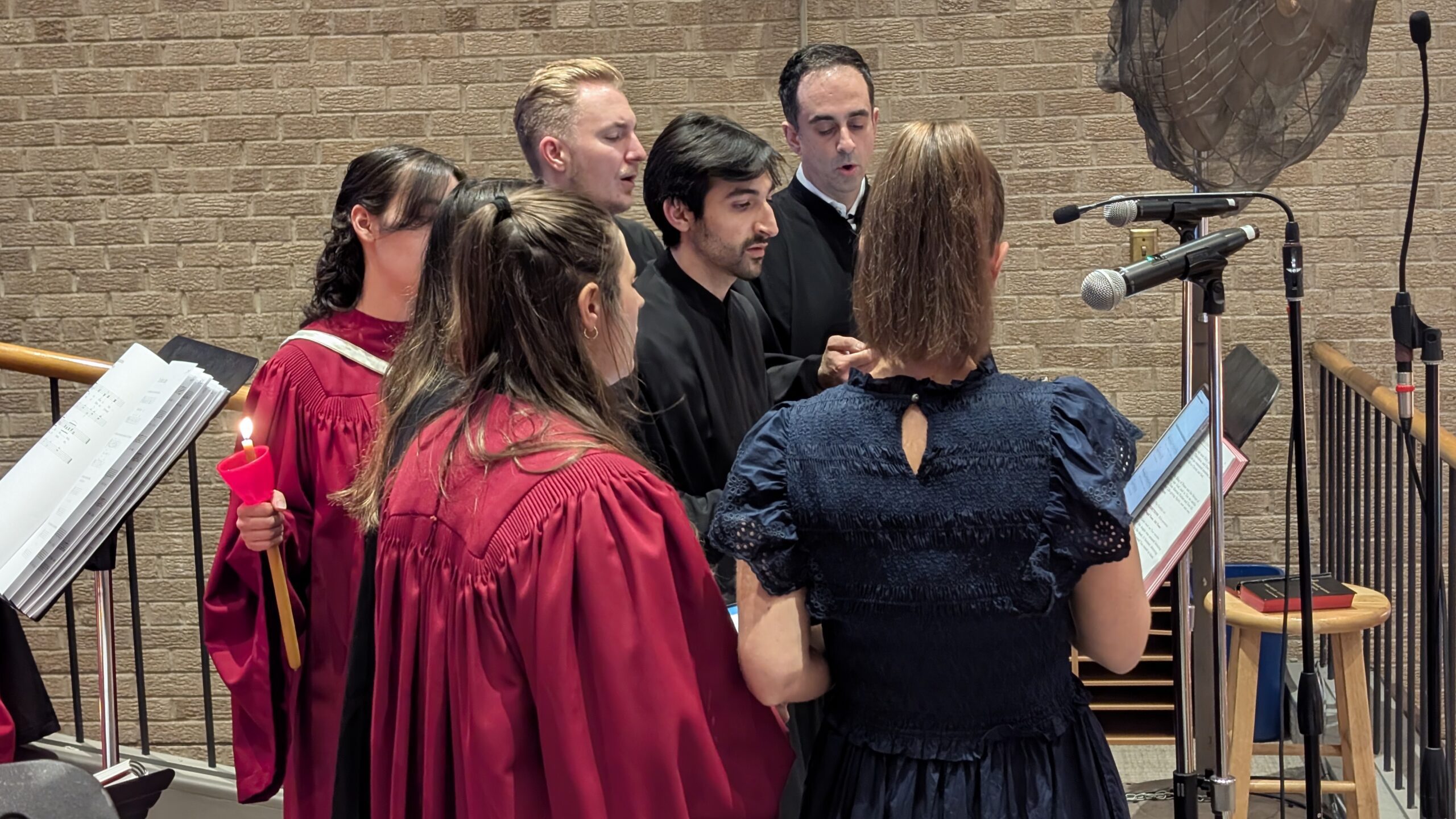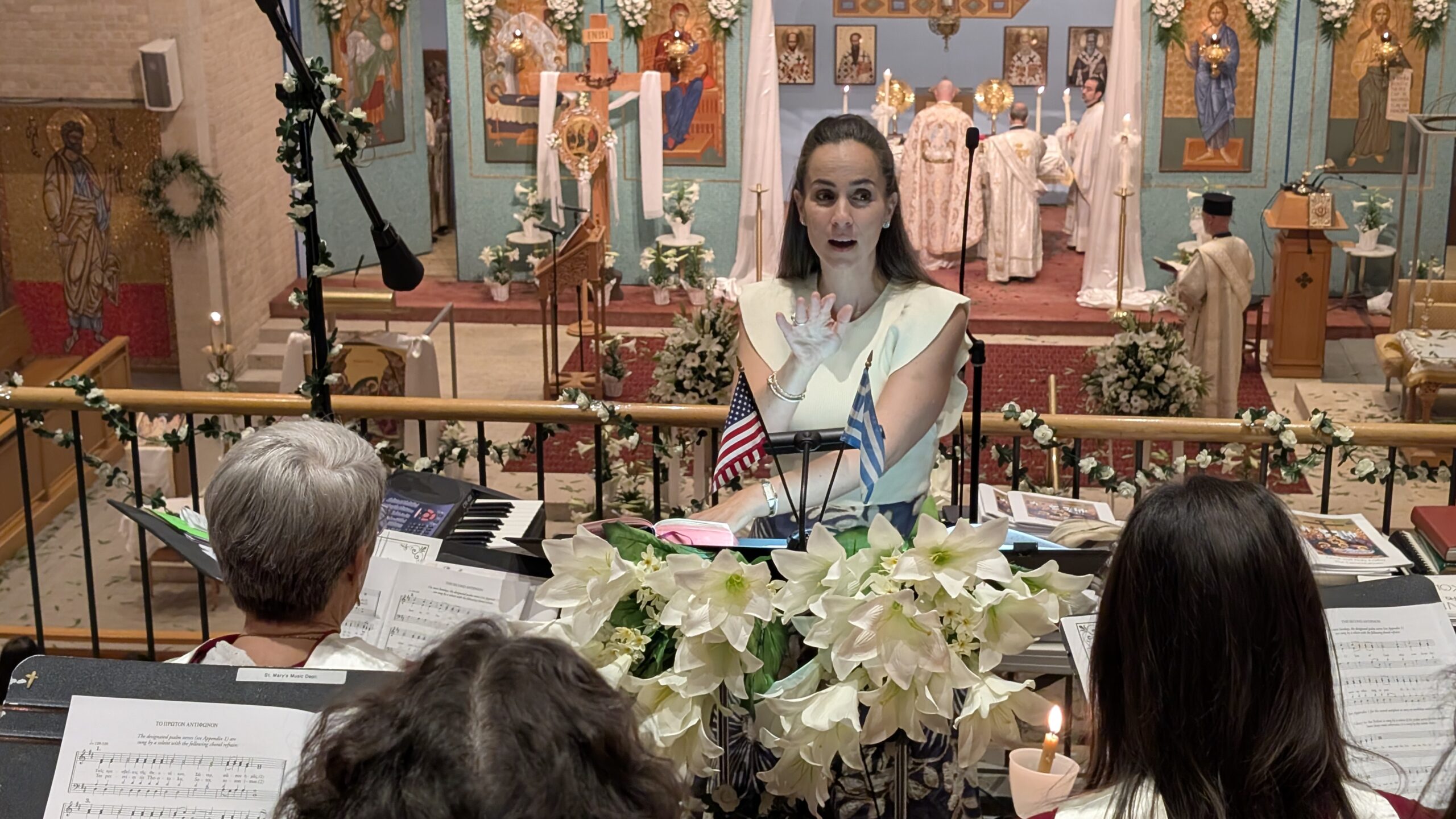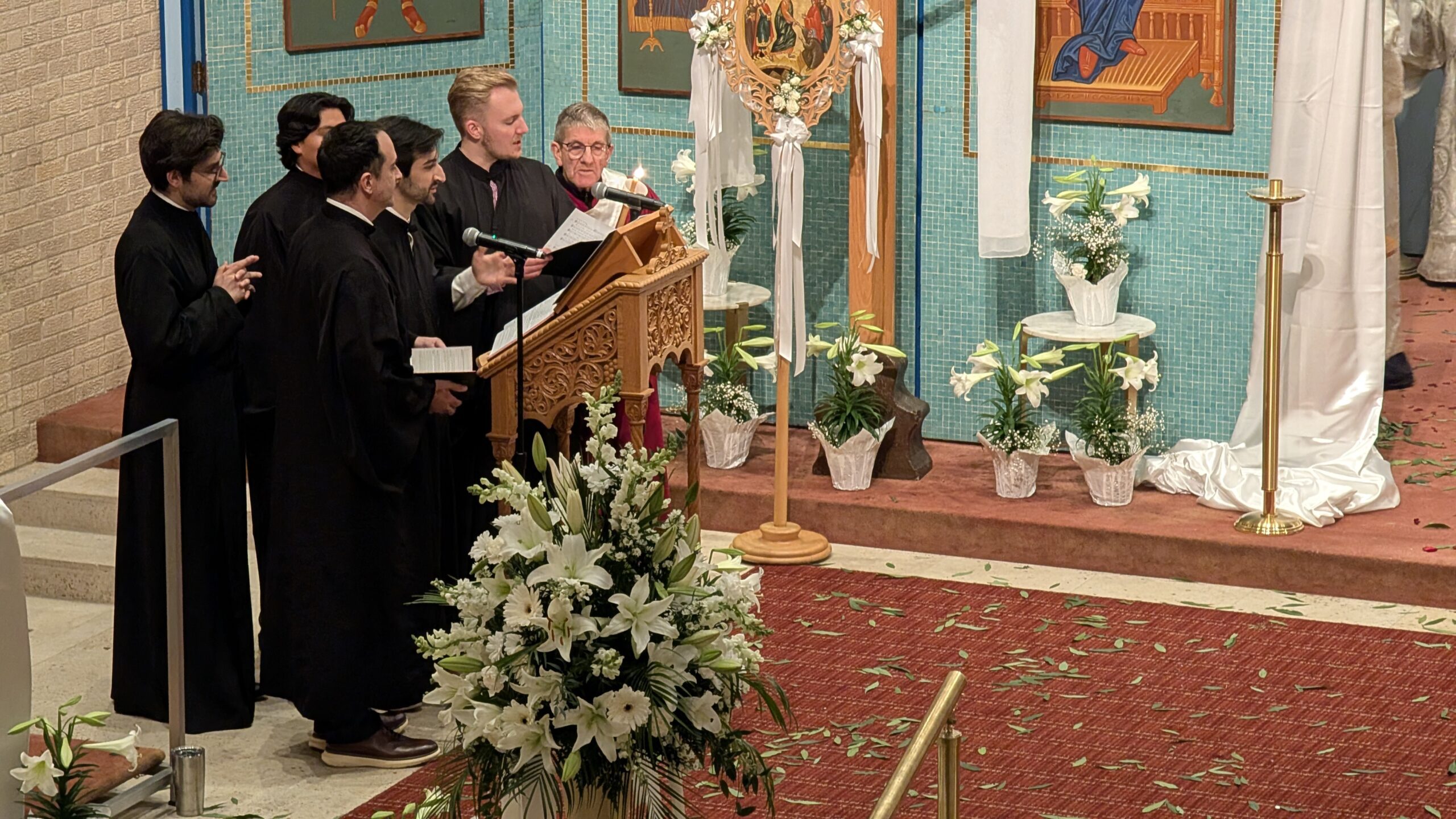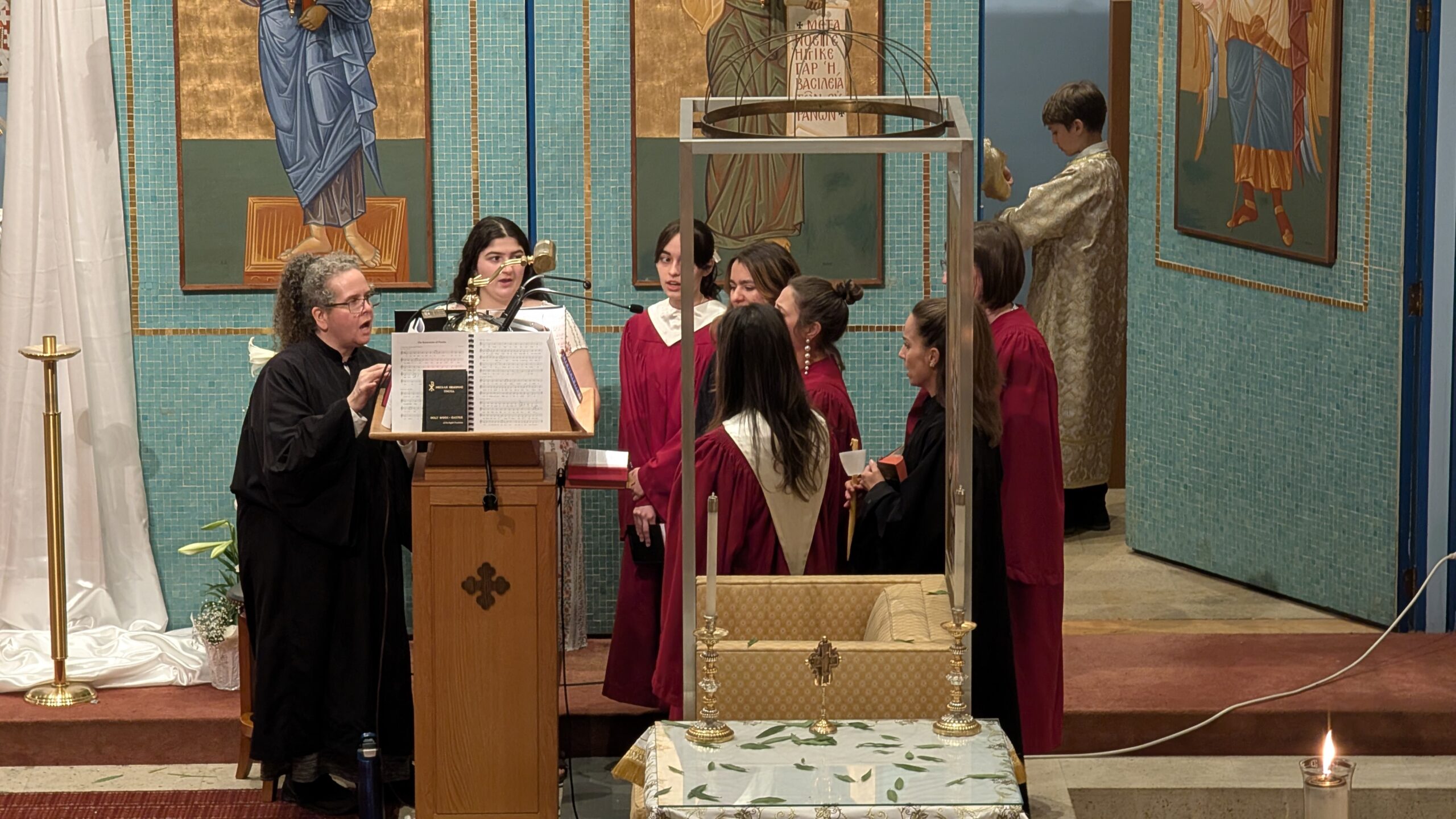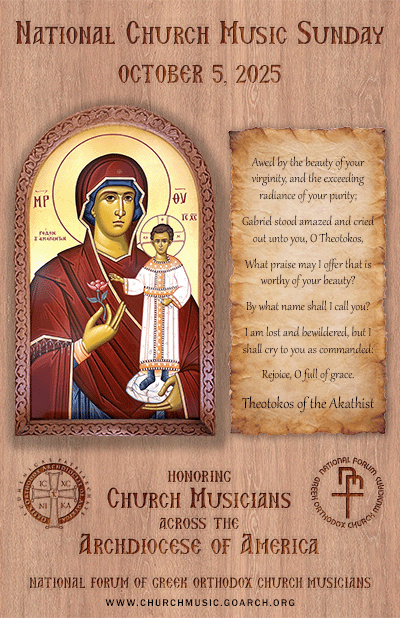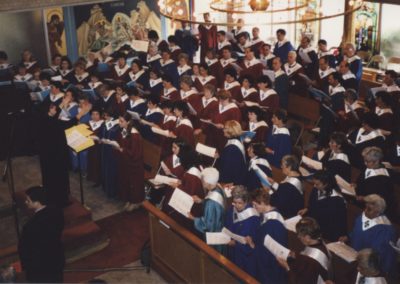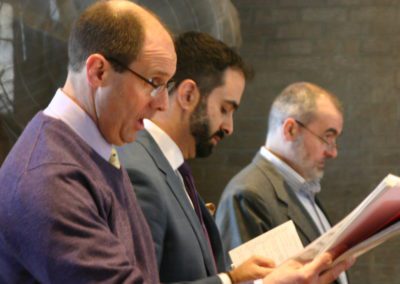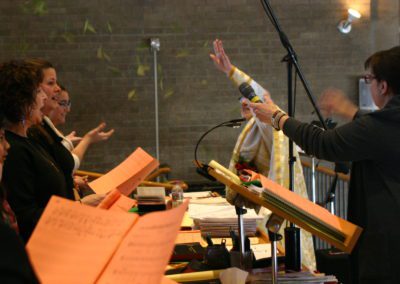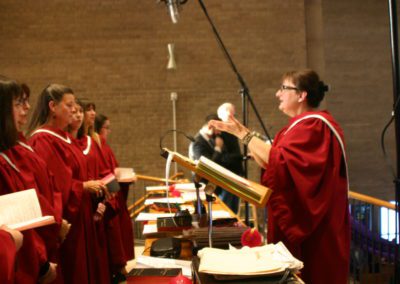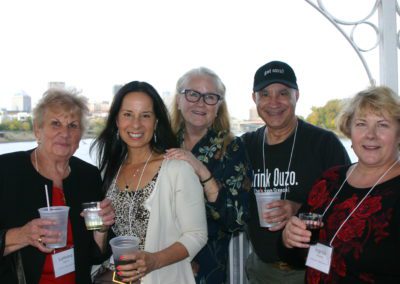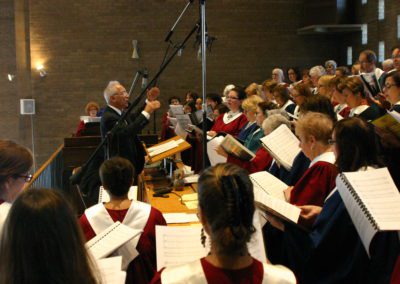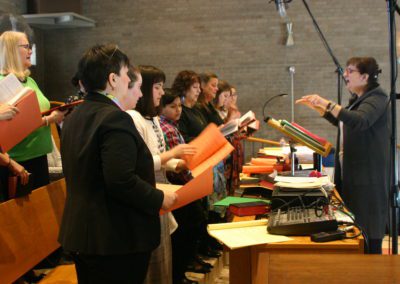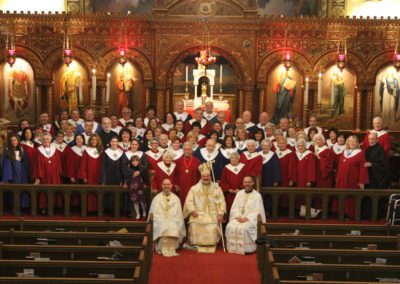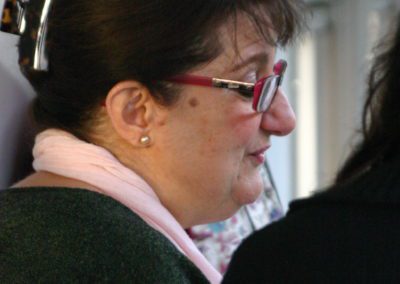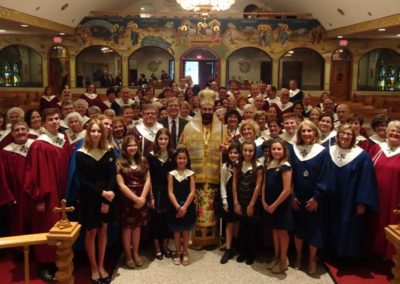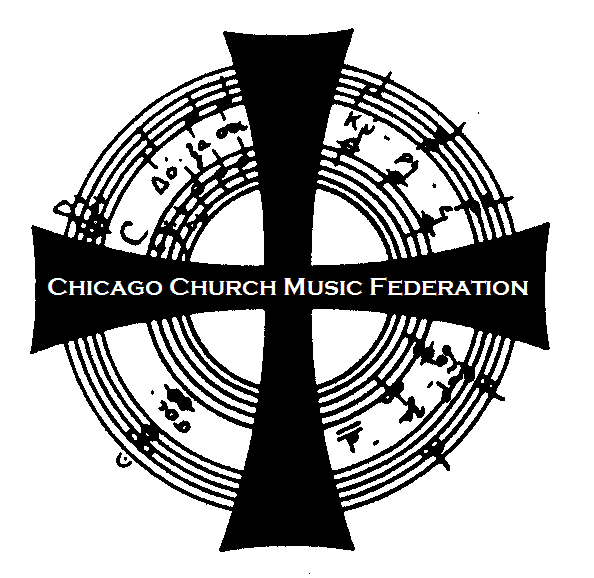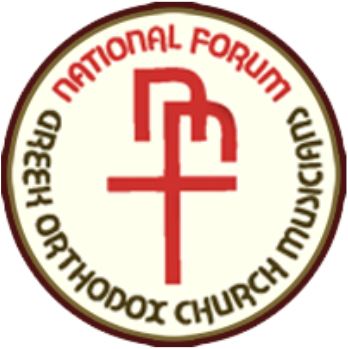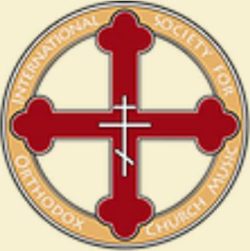Music – Choral and Chant
“If the sounds of music evoke in you calm, pure, holy sentiments—listen to them and nourish your soul.”
St John of Kronstadt
The New Liturgical Year Commenceth.
In 2025/26, Sing More You Must!
- Commenceth – verb, archaic. Third-person singular simple present indicative form of
commence . Of course!
Welcome!
Current Members… ASSEMBLE!
The choir and chant group consists of talented and enthusiastic members.
- The choir sings primarily 4-part choral arrangements of liturgical music, under the leadership of Emily Skoutelis. Music by composers such as Kevin Lawrence, Anna Gallos, Michael Petrovich, Frank Desby, Vassilis Hadzinicolau, Nick Maragos, John Revezoulis, and others.
- The chanters sing Byzantine Psaltic music, reading from Byzantine Notation, under the leadership of Reader Joseph Karos.
Our singers serve the entire congregation with their talents by giving back the gift God has given them. We want to maintain and continually develop a spiritual and stellar sound for our St. Mary’s congregation. This depends on the prayerful, whole hearted participation of our members who have made a commitment to St Mary’s.
It is such a privilege to sing and chant the amazing texts and melodies of our Liturgies & Sacraments.
From St. John Chrysostom: Nothing elevates the soul, nothing gives it wings as a liturgical hymn.
From St. Basil the Great: While your tongue sings, let your mind search out meaning of words, so that you might sing in spirit and sing also in understanding.
Announcements and News
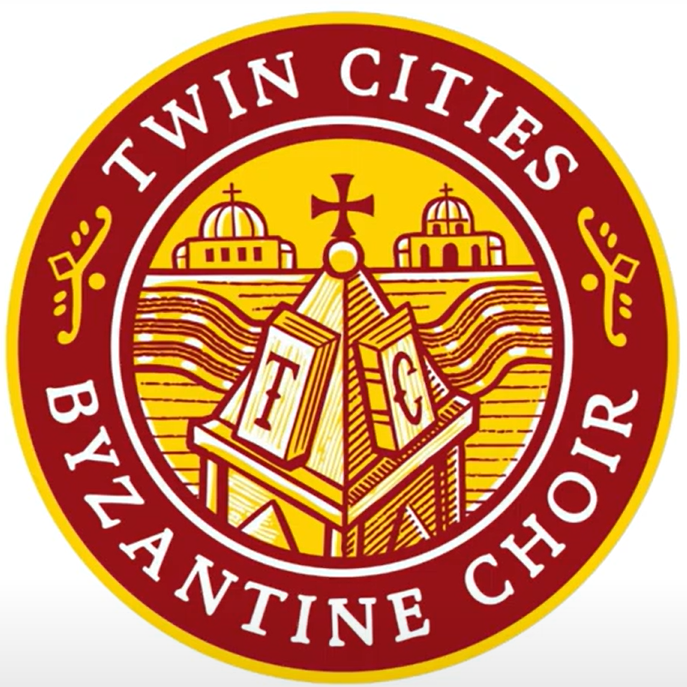
Introducing the Twin Cities Byzantine Choir
With the blessing of His Eminence Metropolitan Nathanael of Chicago, a new [2025] Pan-Orthodox Byzantine Choir is beginning in our community! Founded and directed by our own Reader Joseph Karos, the Twin Cities Byzantine Choir aims to glorify God through the music of the Church. The choir currently includes men and women from these local parishes: St. Mary’s GOC, St. George AOC, St. Elizabeth OCA, St. George GOC, and Holy Trinity OCA.
Joseph currently serves full time as the Protopsaltis (First Chanter) at St. Mary’s, sings bass in our choir, and leads our chanters. Having studied Byzantine Music at the Trisagion School, Joseph has lead chant groups at the Antiochian Village Camp (serving 4 full Summers), at national young adult conferences, and at other Pan-Orthodox events. Joseph teaches Byzantine notation and theory professionally in Minneapolis, hosting a class and private lessons.
Choir & Chanters Rehearsal
Choir 6:30PM every Wednesday, Choir Loft
Chanters: 6:00 PM Every Other Wed, Music Rm
- Choir rehearsal resumes on Wed, January 21, 2026.
- Please arrive promptly and be ready to sing!
- Practice at home! If you need a warmup, sing along to Piccolomini!
- Listen to our groups singing on YouTube. Listen carefully to tone, dynamics, enunciation, and togetherness.
- Contact Joseph@StMarysGOC.org for Chanters Info & Joining.
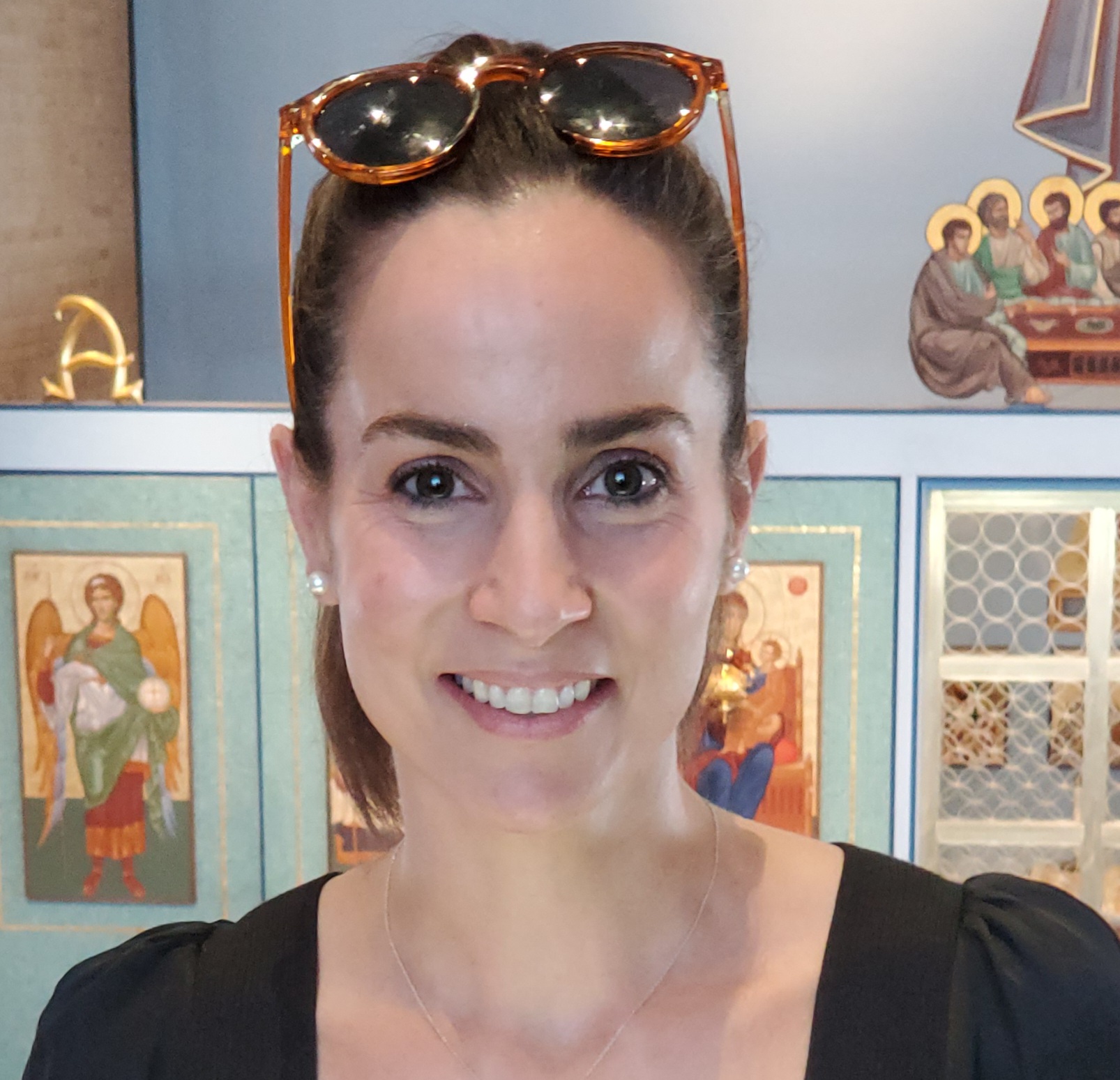
From the Director’s Desk…
Happy New Year!
I want to thank you all for a beautiful, prayerful advent and Christmas season! I think we sounded wonderful, and things were smooth and reverent the whole season. 🙂
Choir Rehearsals will resume on Wednesday, January 21, at 6:30 PM. Lenten Triodion starts on Sunday, February 1, so we will jump right into our music for Triodion and Great Lent.
Christ is Born! Glorify Him!
2026 FOCUS Benefit Concert (from Mark Wesche and Peter Tabeling):
The time has come to sign-up to sing for our 4th annual concert for FOCUS MN. Hopefully you know the drill by now: click the link to access the sign-up sheet, fill in your name and pertinent information. Know someone else interested in singing with us? Send them the link! Spread the word!
2026 FOCUS Concert Sign-up Sheet
Our first rehearsal will be Friday, January 9, at 7:00 PM in the choir loft of St. Mary’s Cathedral. At that point, we hope to have a rehearsal schedule complete with locations which will be dependent on where everyone is from. So, please fill in your home parish.
What’s new this year? Taking a hint from past years, we are instituting a back-up rehearsal plan. So, if there is a snowstorm or it’s so cold our cars won’t start, we’ll reschedule rehearsal for the following Sunday. We’d like to implement some kind of texting tree or some other way to let everyone know if a rehearsal is cancelled last minute.
Sign-up! Happy New Year! See you soon!
In Christ,
Mark Wesche and Peter Tabeling
2026 Choir Conference! St Athanasios, Aurora IL
Visit the Chicago Music Federation Website for Conference information, Resources, Flash Choirs, and much more!
Make new friends for life during 3 days of rehearsals, lectures, meetings, and activities, with a group of dedicated Greek Orthodox choir members from throughout the Chicago Metropolis, culminating with singing the Sunday Divine Liturgy.
The Chicago Metropolis Music Federation and the St Athanasios Church Choir invite you to the 2026 Choir Conference.
Information coming in an indeterminate time!
The Music Federation is a ministry arm of the Chicago Metropolis of the Greek Orthodox Church. We represent the church musicians of our Metropolis, whether they are member choirs, individual stewards, or chanters. Our aim is to sustain the music ministries and traditions of the Orthodox faith, enhancing the spiritual experience for our congregations. We provide the expertise, support and resources needed to form new choirs and allow established choirs to grow in our parishes.
Our programs include the annual youth and adult conferences, round table discussions, flash choirs, workshops, church music institutes [CMI] and participation in a variety of metropolis events throughout the year. Our organization was instrumental in the addition of Sacred Hymnology as a new discipline within the St. John Chrysostom Oratorical and Fine Arts Festival and is entrusted with its development and implementation.

National Church Music Sunday
October 5, 2025
Each year, on the first Sunday in October (on or after the Feast of St. Romanos the Melodist, the patron saint of church musicians), parishes across the Archdiocese of America celebrate National Church Music Sunday. This commemoration was inaugurated by His Eminence, Archbishop Iakovos of North and South America in 1982, and has been re-affirmed by His Eminence, Archbishop Elpidophoros of America.
National Church Music Sunday is a day we set aside particularly to honor the contributions of local choir members, psaltai, and music educators who serve their churches through the hymnology of our Orthodox Church. In addition, it is a day when we recognize the work of the diocesan Choir Federations as well as the National Forum of Greek Orthodox Church Musicians, who through their music ministry, strive to enhance the development of church choirs, church musicians, and liturgical music at diocesan and archdiocesan levels.
To these ends, the National Forum of Greek Orthodox Church Musicians encourages local parishes to use National Church Music Sunday to recognize the contributions of church musicians at three levels each year:
- To honor your Local Church Musicians: your choir director and choir members, your chanters, and other church musicians for their service to the parish;
- To reaffirm your support of your Chicago Metropolis Choir Federation and participate in its activities;
- To support your national church ministry, the work of the National Forum of Greek Orthodox Church Musicians by becoming a Steward of the National Forum and making a contribution to its Annual Church Music Fund Drive held during October.
Choir Organizations
National Forum of Greek Orthodox Church Musicians
The National Forum of Greek Orthodox Church Musicians is the Archdiocesan ministry responsible for liturgical music activities and the development, support, and recognition of church musicians. Chartered in 1976 as an official auxiliary of the Greek Orthodox Archdiocese of America, the National Forum serves as the liaison among local church musicians, metropolis church music federations, and the Archdiocese. It also serves as the gathering place for church musicians to discuss issues related to liturgical music and to formulate needed responses.
The National Forum has four major areas of focus:
- Support for CHOIRS, providing resources and activities to improve the quality of choirs and the availability of choral music in the church,
- Support for CHANTERS and the preservation of BYZANTINE CHANT,
- Support for YOUTH CHURCH MUSIC PROGRAMS, including hymnology and junior choirs,
- Support for CLERGY, including parish music ministries, and support for clergy.
Each year, the National Forum of Greek Orthodox Church Musicians holds an Annual Meeting of its Coordinating Committee, consisting of representatives from each of the eight Metropolis Church Music Federations. On a Clergy-Laity year, the Annual Meeting is held inconjunction with the Clergy-Laity Congress wherever the Congress is held. In other years, the Annual Meeting is held in one of the Metropolises. Each Metropolis Church Music Federation designates five of its members as its delegation to attend and vote. Other National Forum stewards are always welcome to attend the Annual Meeting and participate in the discussions and activities.
National Forum meetings feature great discussion and planning about contemporary church music topics – choir improvement, involving youth in church music, chanter development, and assistance to parishes in developing church music as a ministry. Participants will leave with a richer and broader knowledge of church music ideas, activities, and resources available through our Archdiocese.
All church musicians are invited to participate in the Forum’s Annual Meetings – they are wonderful opportunities to be with church musicians from all across the US and to take part in discussions about Forum initiatives in choir director training, youth, use of English, Byzantine Chant, among others.
Federation of Greek Orthodox Church Musicians, Chicago Metropolis
The Chicago Federation of Greek Orthodox Church Musicians is a ministry arm of the Chicago Metropolis of the Greek Orthodox Church. It represents the church musicians of our Metropolis, whether they are member choirs, individual stewards, or chanters. The aim is to sustain the music ministries and traditions of the Orthodox faith, enhancing the spiritual experience for our congregations. It provides the expertise, support and resources needed to form new choirs and allow established choirs to grow in our parishes.
Programs include the annual youth and adult conferences, round table discussions, flash choirs, workshops, church music institutes [CMI] and participation in a variety of metropolis events throughout the year. The organization was instrumental in the addition of Sacred Hymnology as a new discipline within the St. John Chrysostom Oratorical and Fine Arts Festival and is entrusted with its development and implementation.
Interesting Organizations and People [a work in progress]
- The International Society for Orthodox Church Music (ISOCM)
- Trisagion School of Byzantine Music
- Antiochian Archdiocese Sacred Music Library and Music Resources
- Liturgical Arts – Byzantine Chant Academy
- Worldwide Association of Women in Byzantine Music
- St Vladimir Summer Music Institute 2023
- Orthodox Sacred Music Reference Library
- The Orthodox Arts Journal – Music
- Patriarch Tikhon Russian-American Music Institute PaTRAM Institute
- Laura Boulton Collection of Byzantine and Orthodox Musics
- Dr. Peter Jermihov
- John Michael Boyer – The Koukouzelis Institute
- Photini Downie Robinson – Yphos Studio

Soma Christou Virtual Choir
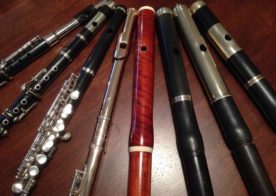
Piccolo-What?
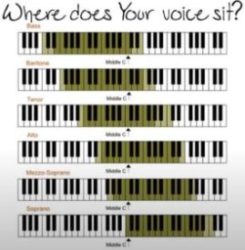
Are you an S, A, T, or B?
Orthodox Saints of Music
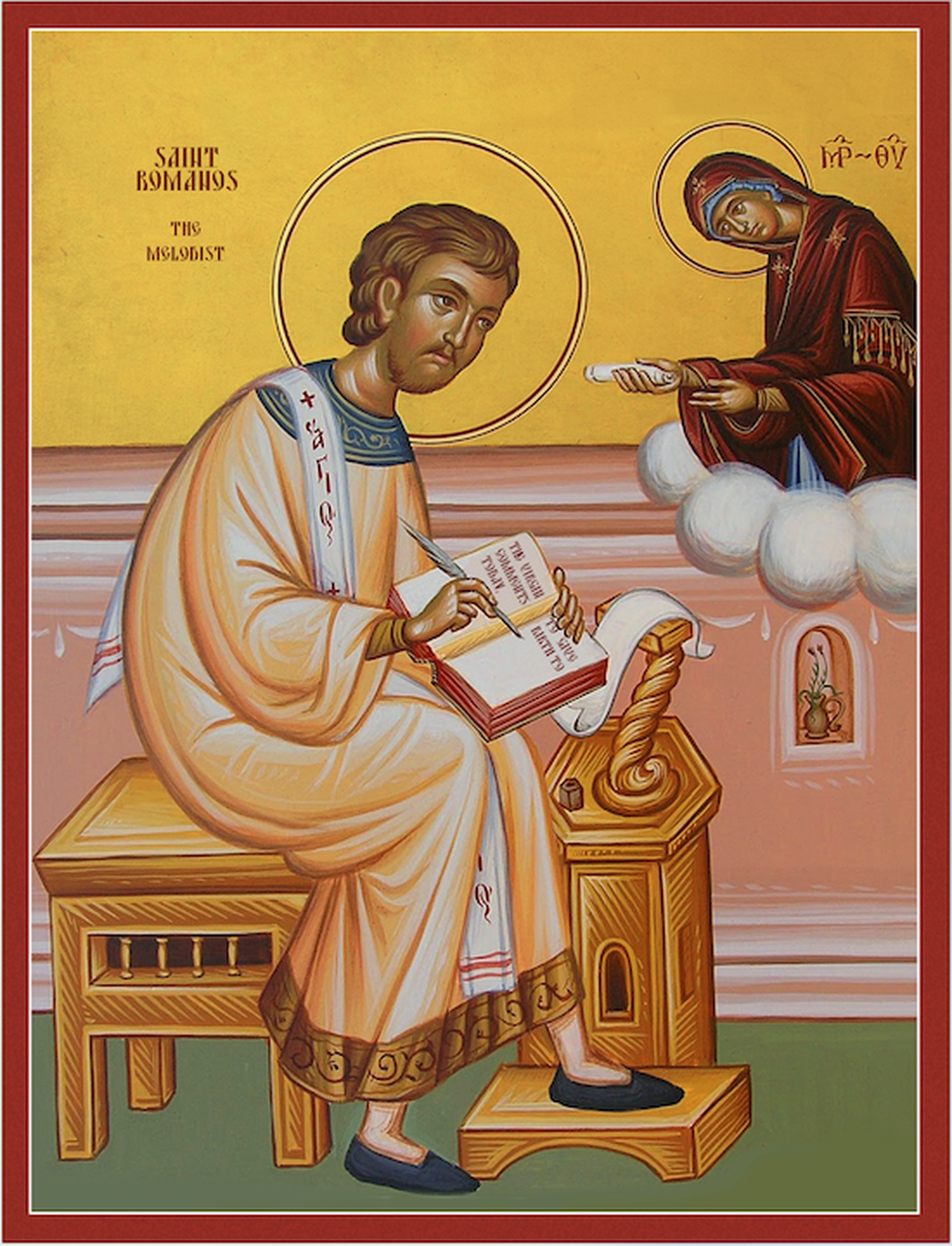
Saint Romanos the Melodist, A Syrian Poet [Oct 1]
“The hymnologists of the Orthodox Church are Christians of virtue and great faith, having been endowed with musical talent as well as the power of religious inspiration. Their creations have enriched our worship services and have helped turn our souls towards God. Perhaps the greatest of all hymnologists is St. Romanos the Melodist (5th/6th century). Many other hymnologists have written ecclesiastical hymns, but none of them inspired the Christians as much as St. Romanos.” This statement, issued by the National Forum of Greek Orthodox Church Musicians concisely states the reverence, appreciation and feeling all Orthodox Christians have for St. Romanos.
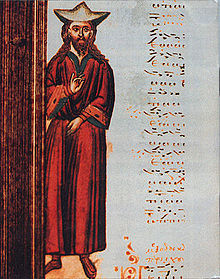
Saint John Koukouzelis [Oct 1]
Saint John Koukouzelis, a native of Dirrachia (Bulgaria), was orphaned in childhood. Endowed with a very fine voice, he entered the Constantinople court school. He found favor with the emperor John Comnenos (1118-1143) and became a chief court singer. The sumptuousness and luxury of the imperial court bothered the pious youth. Once, when asked what he had eaten for dinner, he replied, “Beans and peas.” The name Koukouzelis (beans and peas) stuck with him ever after.
Read more about St John – SVOTS.
Read more about St John – Wikipedia
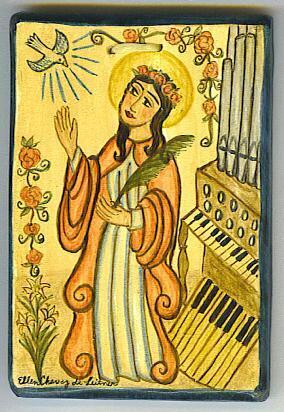
Saint Cecilia [Nov 22]
St. Cecilia (2nd/3rd century) is regarded as the patroness of music, because she heard heavenly music in her heart when she was married, and is represented in art with an organ or organ-pipes in her hand.
Officials exhumed her body in 1599 and found her to be incorrupt, the first of all incurrupt saints. She was draped in a silk veil and wore a gold embroidered dress. Officials only looked through the veil in an act of holy reverence and made no further examinations. They also reported a “mysterious and delightful flower-like odor which proceeded from the coffin.”
Read about St Cecilia – OCA
Read more about St Cecilia.
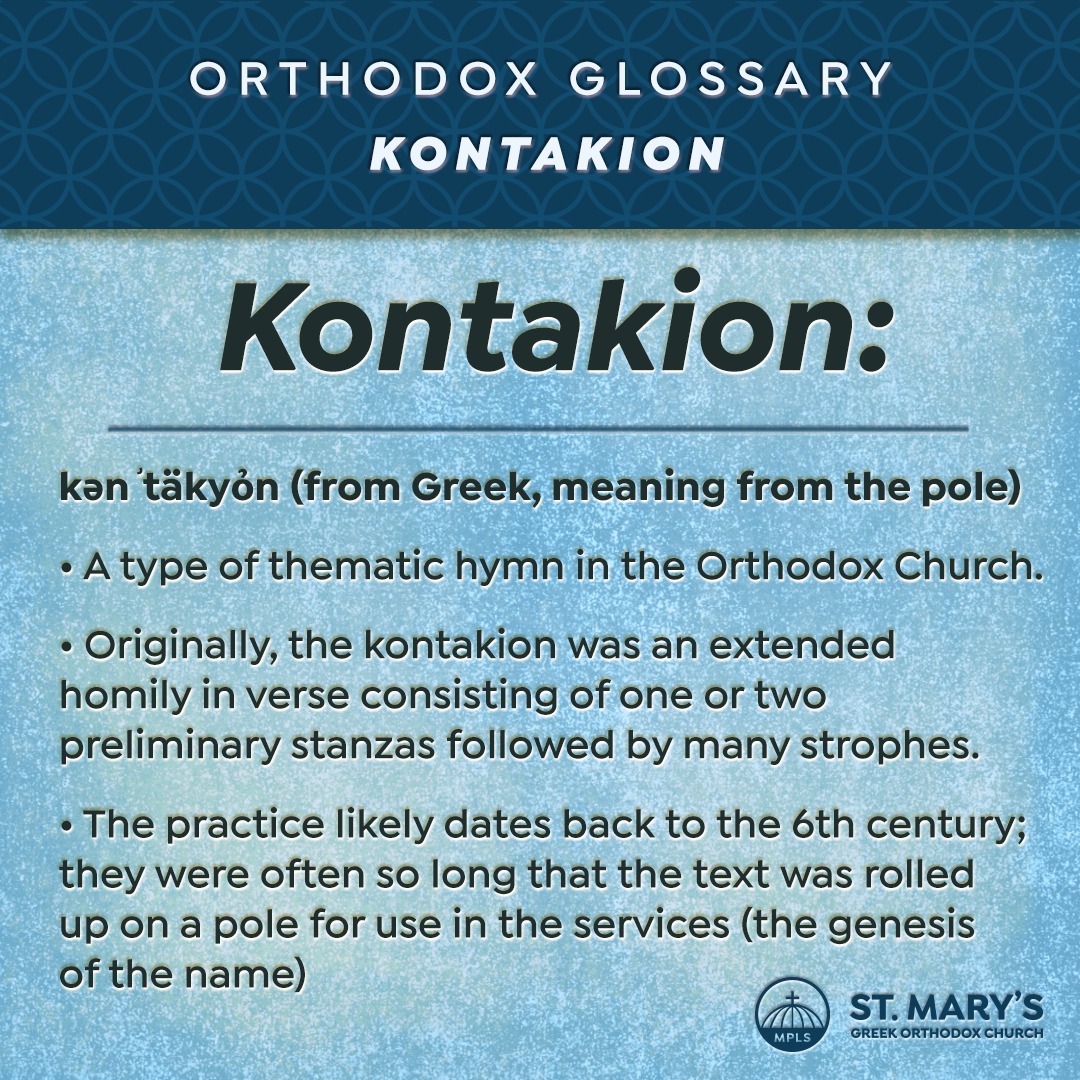
Kontakion – “From the Pole”
- Etymology: Middle Greek kontakion, literally, scroll, probably diminutive of Late Greek kontak-, kontax pole, from Greek kontos.
- A Kontakion (also kondakion, kondak, and kontak; plural kontakia, kondakia) is a type of thematic hymn in the Orthodox Church and other Eastern Christian churches. Originally, the kontakion was an extended homily in verse consisting of one or two proemia (preliminary stanzas) followed by several strophes called oikoi (also ikoi; singular oikos, ikos), usually between 18 and 24. The kontakia were so long that the text was rolled up on a pole for use in the services – the genesis of the name kontakion, which means “from the pole” in Greek. It is typical of the form that each of the proemia and strophes end with the same refrain. Acrostics are also a hallmark of this hymnographic form. In current practice, the kontakion has been greatly abbreviated. Only the (first) proemium and first strophe are sung or read after the sixth ode of the canon at orthros. The proemium alone is sung at the Divine Liturgy, following the troparia, and most other services of the daily cycle. The kontakion is not sung at vespers.
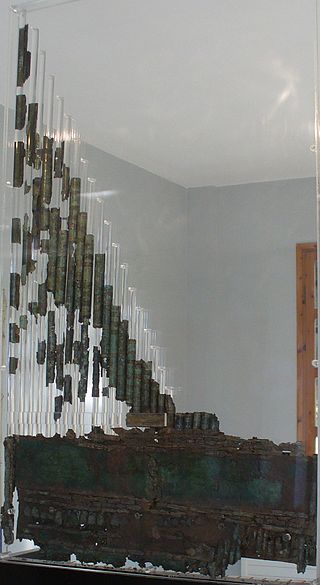
The Organ – ὄργανον (órganon). It’s Greek!
The Greek engineer Ctesibius of Alexandria is credited with inventing the organ in the 3rd century BC. He devised an instrument called the hydraulis, which delivered a wind supply maintained through water pressure to a set of pipes. The pumps and water regulators of the hydraulis were replaced by an inflated leather bag in the 2nd century AD, and true bellows began to appear in the Eastern Roman Empire in the 6th or 7th century AD.
The 9th century Persian geographer Ibn Khurradadhbih (d. 913), in his lexicographical discussion of instruments, cited the urghun (organ) as one of the typical instruments of the Eastern Roman (Byzantine) Empire. The first Western European pipe organ with “great leaden pipes” was sent from Constantinople to the West by the Byzantine emperor Constantine V as a gift to Pepin the Short King of the Franks in 757.
Because organs are commonly found in churches and synagogues, the organ repertoire includes a large amount of sacred music, which is accompanimental (choral anthems, congregational hymns, liturgical elements, etc.) as well as solo in nature (chorale preludes, hymn versets designed for alternatim use, etc.).
[Text and photo from Wikipedia.org]
General Information
Announcing St Mary’s Choir 2024/25 Season
Our senior choir provides musical responses and hymns for our Sunday Divine Liturgies throughout the year, as well as Christmas Eve, Holy Friday & Pascha Midnight services. We sing mostly in English alternating with some Greek and maintain a Byzantine ethos in almost all of our hymnology.
The Choir Family
Singing together creates a strong family-like bond. This is clearly felt as choir members participate in events outside of the choir loft. Some of these events include:
- Annual Chicago Metropolis Choir Conference. St. Mary’s choir members have enjoyed traveling together to various host parishes throughout the five state area. Three days of intense rehearsals, workshops, and fellowship culminate in a Sunday Liturgy choir with over 100 singers. Our St. Mary’s choir is often the largest group in attendance!
St. Mary’s Choir hosted the following Choir Conferences at St. Mary’s:- 1969 Tikey Zes directing his composition
- 1980 Presbytera Anna Gallos directing her composition
- 1990 Presbytera Anna Gallos directing another of her compositions
- 2001 Thespina Macres directing Nick Maragos composition
- 2015 Chris Kypros directing his composition “Liturgy of Hope”
- Educational Workshops. Throughout the years, the choir has sought out continuing education, above and beyond the weekly rehearsals. One example, perhaps the most challenging, was a Byzantine Notation workshop by Jessica Suchy Pilalis.
- Community Outreach. Small groups from the choir have volunteered at a local homeless shelter cooking and serving food.
- Fellowship.
- An almost annual summer choir picnic
- Singing on a float in the Winter Holidazzle Parade (only once, brrr!)
- Fundraising by selling baklava in the State Fair Food Building
- Hosting the Palm Sunday Luncheon for our parishioners
- Hosting many fundraising Glendis
- Annual Christmas gathering
- Much more than can be listed
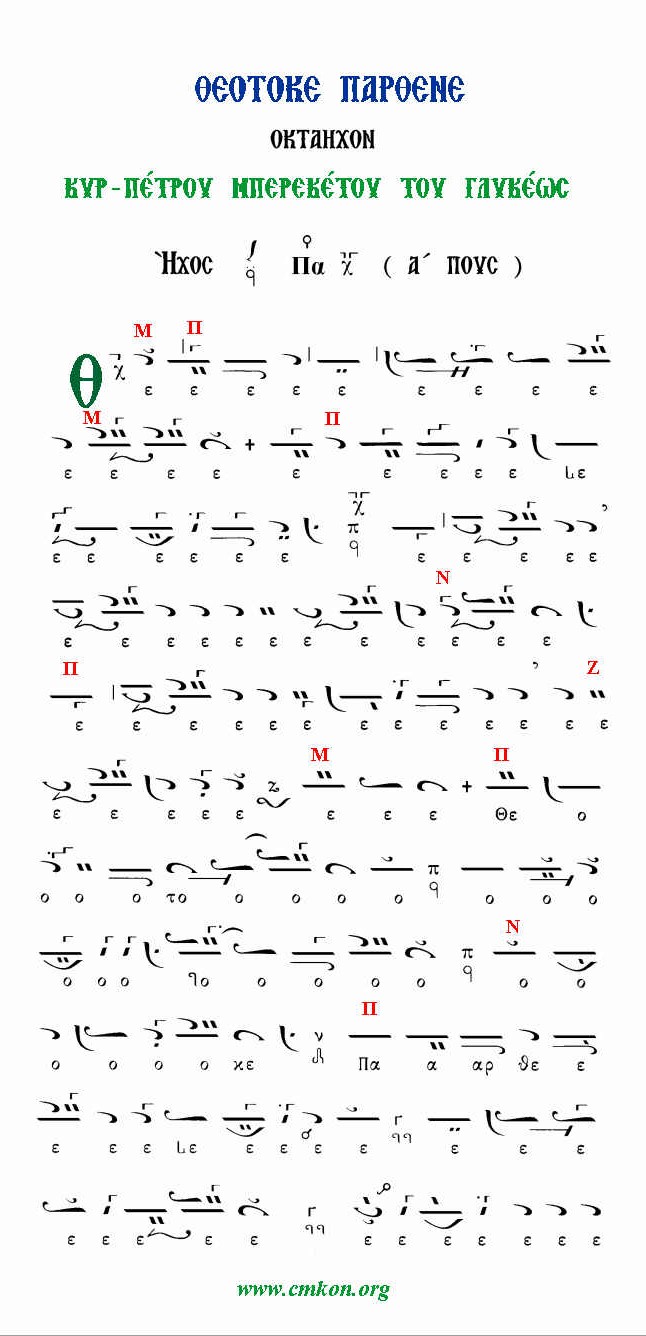
Byzantium Unleashed!
In 987, the emissaries of Prince Vladimir of Kiev finally arrived in Constantinople, where they were taken to Hagia Sophia (Ἁγία Σοφία), the cathedral church of the capital. Their report was this: “We knew not whether we were in heaven or on earth. For on earth there is no such splendor or such beauty, and we are at a loss how to describe it. We know only that God dwells there among men, and their service is fairer than the ceremonies of other nations. For we cannot forget that beauty.”
The purpose of Orthodox liturgical music is to uplift the prayers of Orthodox faithful and to have a worship experience that transports us to the Kingdom of Heaven. In Hagia Sophia during the height of the Byzantine Empire is the origin and purest form of Byzantine Chant. From ancient Byzantium, the chant has developed significantly, though it still shares the same roots.
Byzantine Chant even has its own notation and style of sheet music! Unlike staff notation that we all learned in grade school, Byzantine notation is relative, meaning the sheet music gives the chanter a starting pitch and “instructions” on how many pitches to ascend or descend from the homebase note. For example in western music terms, if the hymn starts on C and the next note is E, the Byzantine music would have a symbol telling the chanter to ascend two notes.
Have you ever heard someone say “first mode” or “that’s in fourth mode?” That is because Byzantine Chant is made of a system of 8 modes, each one having a different sound and melodic movements. Having a variety of modes is used to communicate different emotions in the hymnology. Some modes communicate a triumphant sound, while some communicate a somber, repentant tone. Ultimately, the purpose of all of this is to glorify Christ and worship Him with the best that our voices can offer! Chanting the divine services at St. Mary’s is a true joy and I am thankful to be with you all!
In Christ, Joseph Karos, Protopsaltis
Time & Talent Spotlight – Chanting
An Interview with Deanna Kolas
How long have you been serving St. Mary’s on the Chanting Team?
It’s been a little over a year now.
What was it that led you to first serve by chanting?
Chanting was something I’ve been interested in for a long time. I’ve been singing since I was in middle school. When I got to high school, I realized that chanting could be a way for me to give back to the church while doing something I really enjoy. At the time, I didn’t really have the resources or someone to guide me in learning, so I put a pause on it then. As I got older, my cousin Evie invited me one day to stand up with her during a Vespers service. She guided me through the service and made me feel more comfortable. Now as a part of the Chanting Group, I’ve learned so much from Thespina, Dan, and Joanna as they have taken me under their wing.
How often do you chant?
Usually once or twice a week, typically for the Matins or Orthros before Liturgy. When I can, I also like to chant for Vespers on Saturday nights.
Do you have a favorite memory associated with this serving experience?
We had a young adult event at St. Mary’s on a night I was scheduled to chant. At first, I was nervous to be chanting in front of all these young adults that I know! But it was really fun, because when I got to the service, I invited some of the other young adults to chant with me. A few were from other parishes, and even though each church chants in a slightly different way, we were able to come and chant together which was a beautiful experience.
If someone else was interested in serving by chanting, what would you say to them to help try to convince them?
I would say if you’re interested in it, it’s a beautiful way to give back to the church. People really appreciate it and there is always a need. We appreciate having a lot of people to help because there are always services going on at the church. It can be hard at first and intimidating and scary, but everyone who chants alongside you and who listens to the chanting is really understanding, forgiving, and encouraging. It’s always going to be a learning experience. Chanting is a beautiful way to connect with your faith and give back to the church.
Who should someone contact if they want to learn more about chanting?
Joseph Karos, Joseph@StMarysGOC.org
